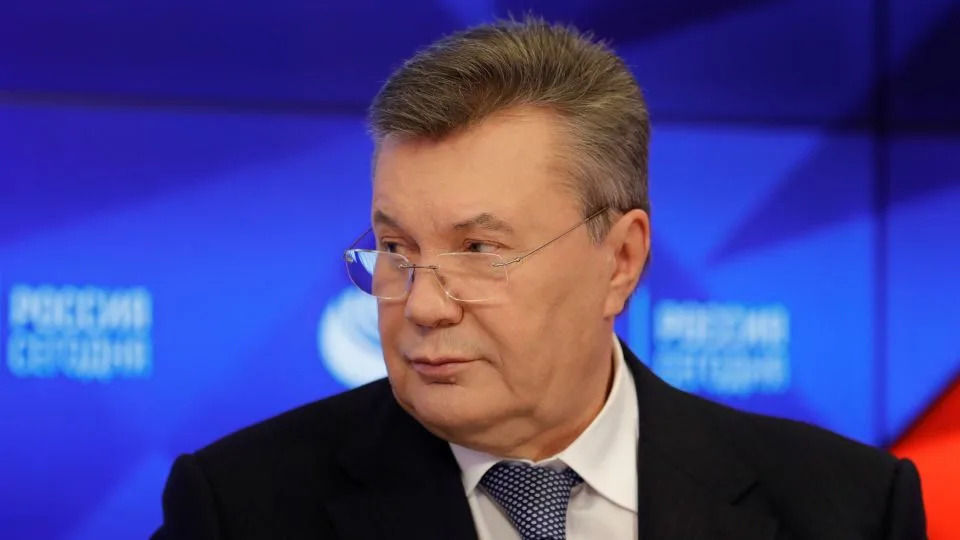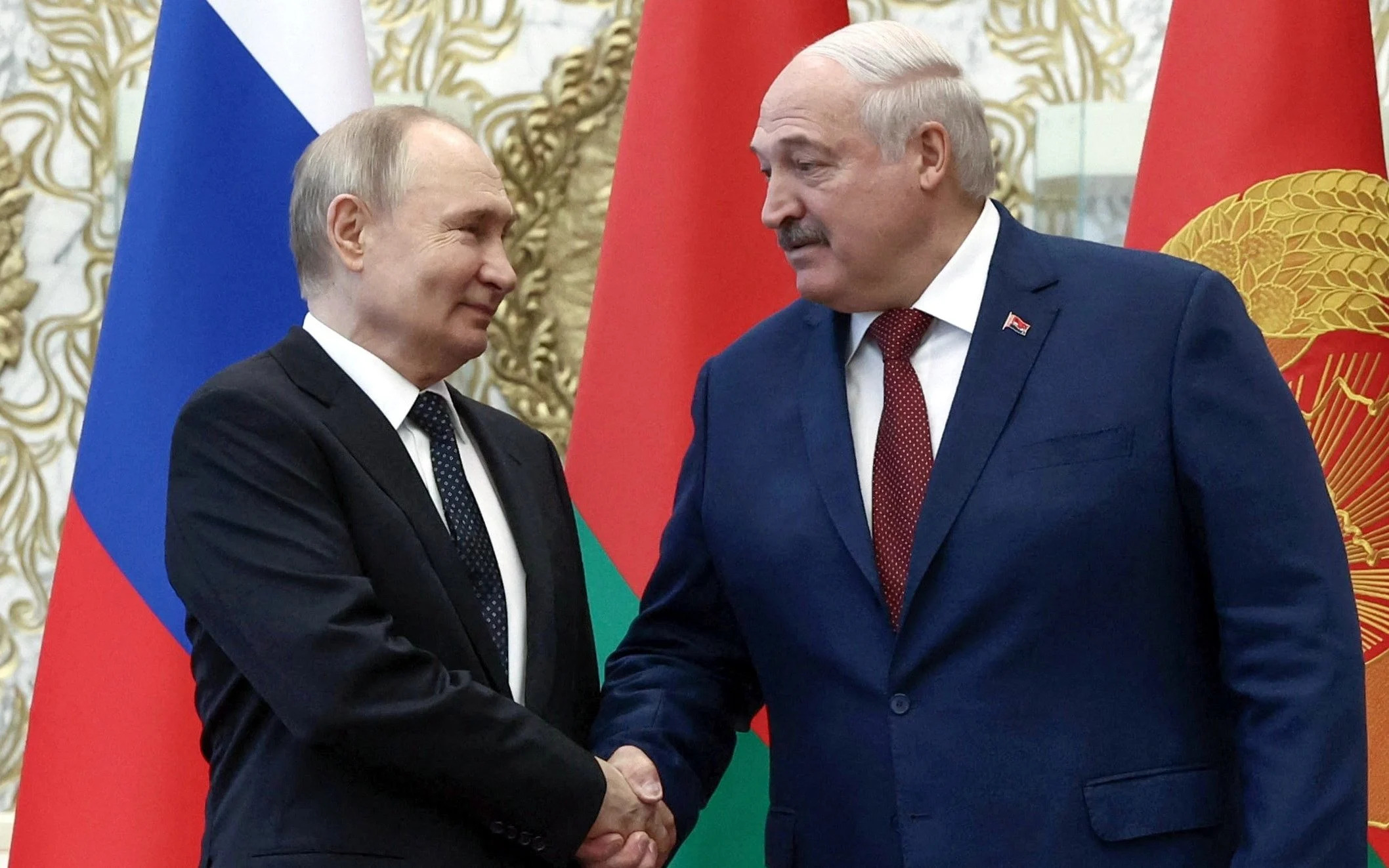Russian President Vladimir Putin’s signaling this week that he is open to peace talks should be viewed with vast, overshadowing caveats, and the weight of Ukraine’s - and the West’s - past experience of Russian diplomacy.
Friday saw a wealth of noise about negotiation, in the same month Moscow launched a third invasion of Ukraine from the north of Kharkiv.
The Reuters news agency cited four sources, in a report from two deeply experienced and connected Russia reporters, that Moscow was willing to consider peace talks which would freeze the current Russian occupation of about a fifth of Ukraine.
Putin responded to that report by suggesting Russia was willing to talk peace, based on earlier agreements. He hinted at an aborted deal in Istanbul, just after the war began, in 2022, which fell apart, mostly because Moscow’s forces were still rampaging across Ukrainian territory, and massacres around Kyiv had come to light.
The idea floated in the Reuters report would stop short of Moscow’s stated goal of capturing all of eastern Donetsk, but also eradicate Kyiv’s insistence it should not surrender any territory.
The context of Putin’s remarks was key. They came during a visit to Belarus’ President Alexander Lukashenko - something which in the past occurred moments before the Kremlin used Belarusian territory for military moves into Ukraine, while on Friday took place during joint tactical nuclear weapons drills between the two countries. Putin was talking peace with a backdrop that was anything but.
Get AfriPrime Android Web View app....Click the link to Amazon app store to download https://rb.gy/3xek46
Putin questioned the legitimacy of Ukraine’s President Volodymyr Zelensky, who Moscow has repeatedly assailed, after Kyiv had to delay elections because of the very war Putin started. At the same time, there were unconfirmed reports that the private jet of former Ukrainian President Viktor Yanukovich had landed in Belarus. The pro-Russian Yanukovich fled Ukraine in 2014 after forces loyal to him shot dead dozens of protestors in central Kyiv. The mere possibility of his presence while Putin and Lukashenko met led to speculation Moscow was again hoping to engineer the return of a proxy to power in Ukraine.

The Kremlin’s less brutal goal in Ukraine – short of full or partial occupation – has involved a president in Kyiv it considers loyal, who will stop the country’s march towards the European Union and NATO. It was fanciful before the 2022 invasion, and came up during the aborted 2022 Istanbul talks. But now it would likely need an occupying Russian force to impose it on a population seething at the Kremlin’s brutality.
So why the talk of peace, particularly when Russia appears to be having its most successful moment on the frontlines in months, if not since the invasion?
Diplomacy has always been a military tool for the Kremlin. It talked peace over Syria in 2015, as their jets pounded civilians in rebel-held areas. It talked peace in 2015 with Ukraine, while Russian troops and their proxies were in the throes of a full assault against the strategic Ukrainian town of Debaltseve.
It is not cynical to distrust Russia’s sincerity when it negotiates, but a practical necessity. Experience shows it considers talks worth pursuing in case they unexpectedly produce a useful outcome without violence, or give their opponent cause for pause in fighting to try and encourage a deal.
Moscow may also be talking peace again now for two reasons. Firstly, Ukraine and its allies are convening a peace summit in Switzerland in June, where it will discuss, without Russia, what sort of deal it might accept. It is likely aimed at building momentum for an off-ramp the Kremlin can take when its forces are finally militarily exhausted or in a stalemate.
Zelensky has said he hopes China - Russia’s most potent ally but only partial supporter in the Ukraine war - will attend. Putin may be talking peace now to suggest to Beijing to not be involved in diplomacy about Russia without Russia present. There is little serious chance the Switzerland summit will end the war, but it might concretize minds in the West as to how serious a threat Moscow poses to an actual peace deal by laying out the bones of what damage Ukraine might have to absorb to its territorial integrity to stop the bloodshed.
Get AfriPrime Android Web View app....Click the link to Amazon app store to download https://rb.gy/3xek46

Ukraine’s Foreign Minister, Dmytro Kuleba, said Friday that Putin’s hints at peace talks were directly aimed at sabotaging the summit. “Putin currently has no desire to end his aggression against Ukraine”, he wrote on X, adding “this is why he is so afraid of” the Switzerland summit.
Secondly, and most importantly, Putin is messaging governments in the West and the current American presidential campaign. He is trying to opaquely suggest – perhaps to populists in Europe, or MAGA Republicans in the United States – that a simple deal is in hand, one in which frontlines, on which Ukraine is currently losing with significant casualties, can suddenly freeze.
Get AfriPrime Android Web View app....Click the link to Amazon app store to download https://rb.gy/3xek46
Western support for the war is costly, and increasingly unpopular – although the recent $61 billion passed by Congress has perhaps given the issue a reprieve from being at the mercy of electoral opinion for about a year.
The Reuters report permits those in the West who want to see an end to the war to believe the Kremlin could stop the war, as it stands, immediately. Kremlin spokesman Dmitri Peskov made the report sound like it reflected Russia’s permanent position. But ultimately it may sound new and interesting to key Western figures: Donald Trump - who has failed to explain how he would enact his claim he could stop the war in 24 hours – and other NATO members who are less bullish than France, the UK and the Baltic states, about the need to never trust Russia at the negotiating table.
Putin is a pragmatist. He started the war thinking it would be easy. He continued it thinking his tolerance for pain, autocratic security, and patience for victory would triumph. He might be right, just now. He now sees a moment of electoral weakness in the US, and other European states, which he has met with a vague, opaque signal that there might be a time for diplomacy.
It will likely gain some traction among those who desperately hope the war in Ukraine will just go away, and who are less mindful of the existential threat a victorious and hyper-militarized Moscow poses to NATO’s eastern members. But it should be viewed through the lens of the deep cynicism of Moscow’s earlier diplomacy in Syria and Ukraine: used as a time to ferociously pursue the same military objectives, but with the illusory backdrop that peace might be just around the corner.
Get AfriPrime Android Web View app....Click the link to Amazon app store to download https://rb.gy/3xek46
Putin wants ceasefire in Ukraine, Kremlin sources say
Vladimir Putin shakes hands with Alexander Lukashenko, his Belarusian counterpart, in Minsk, Belarus, on Friday
Vladimir Putin has hinted at a ceasefire in Ukraine as Kremlin sources said the Russian leader believes he has taken enough territory to present as a victory.
Moscow aides told Western journalists that Putin is ready for a deal to “freeze the war” along the current front lines.
They also admitted that Russia may not be able to make a significant breakthrough in the fighting without mass mobilisation, which Putin opposes.
Offers of a ceasefire will be viewed with heavy scepticism in Ukraine and the West, which is gearing up for their own peace summit, as well as G7 and Nato talks - all of which Russia is excluded from.
But the comments on the risks of mass mobilisation for Russia offer a rare glimpse into anxiety about the war within the Kremlin.
In briefings given to the Reuters news agency, Kremlin sources said Putin blamed Volodymyr Zelensky for dodging peace talks as he was prepared to order his advancing armies to halt.
“Putin can fight for as long as it takes, but Putin is also ready for a ceasefire - to freeze the war,” said one of the sources.
Mr Zelensky has said that he will not negotiate with Putin and has pledged to retake all land captured by Russia.
Putin is also in his strongest position since his initial invasion of Ukraine in February 2022. His armies are on the front foot on the battlefields and his industry is outproducing Ukraine’s allies for arms and weapons, vital in a war that has descended into a slugging match.
However, the sources said that Putin was genuine about pushing for a ceasefire because he has become wary of the cost of the war and believes that he can sell territorial gains as a “win” to Russians.
“Putin will say that we won, that Nato attacked us and we kept our sovereignty, that we have a land corridor to Crimea, which is true,” said one.
Three sources said Putin understood any dramatic new advances would require another nationwide mobilisation, which he did not want, with one source, who knows the Russian president, saying his popularity dipped after the first mobilisation in September 2022.
Get AfriPrime Android Web View app....Click the link to Amazon app store to download https://rb.gy/3xek46
Ceasefire contradicts nuclear push
Russia now occupies around 18 per cent of Ukraine, including Crimea which it annexed in 2014, but the Kremlin has failed to capture the whole of any other region despite promoting the conquest of the eastern region of Donbas as a priority.
This month, Russian forces launched an attack towards Kharkiv in the northeast of the country for the first time since it was routed from the outskirts of the city in 2022.
Putin has previously said that he is interested in finding a ceasefire to the fighting in Ukraine, including during a visit this month to China, Russia’s most important economic ally.
China has promoted a 12-point peace plan to the war in Ukraine which has been widely discredited.
Calls by Putin for a ceasefire in Ukraine also appear to contradict his increasingly aggressive posture around Russia’s nuclear weapons.
This week, Russian forces practised using a tactical nuclear weapon on a mock battlefield and Putin also visited Belarus for talks focused on Russian nuclear weapons stationed there since last year.
Analysts said the Kremlin comments may be designed to spread dissent among some of Ukraine’s European allies who are growing tired of the cost of backing Kyiv.
Samuel Ramani, an Associate Fellow at the Royal United Services Institute in London, said: “Putin is effectively harnessing the ‘immediate ceasefire’ component of China’s peace proposal to present a good faith image, knowing that Ukraine will not accept this.”
Senior EU defence officials dismissed the comments from the Kremlin sources and promised to double down on support for Ukraine to head off the Russian invasion.
“Our position at the EU level and in connection with our US partners is that we will continue to deliver the necessary aid to avoid any failure and defeat, which will not only be catastrophic for Ukraine and for us,” a senior EU official said.
“We are not changing our direction and the determination is fully intact despite what Putin can say or has announced,” he added.
“We are on the same track of full support for Ukraine.”
Western officials have previously described Putin’s calls for peace talks as “disingenuous” in the belief that the Russian president still holds maximalist war aims to topple the Ukrainian government.
Mykhailo Podolyak, one of Mr Zelensky’s main advisers, called the offer of peace “rather disgusting”.
“Putin is once again mockingly offering democracies to lose, to kneel down. Not to Ukraine, but to Western democracies.
“No more, but no less. Because this is not about peace, rules, or a ceasefire, but only about impunity and the continuation of the war,” he said.
Get AfriPrime Android Web View app....Click the link to Amazon app store to download https://rb.gy/3xek46



